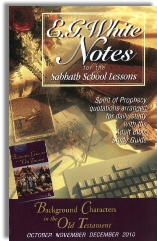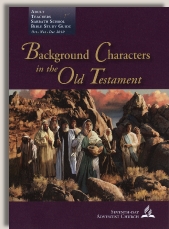|
||||||||||||||
Commentary on "Story and History"
Day 3: Monday, September 27, 2010 - Where and How?
Overview
Today's lesson presents the concept of setting as establishing the circumstances that lead to the crisis the characters face in a story. It cites Boaz sitting in the city gates to transact his assuming the legal role of being Naomi and Ruth's kinsman redeemer. Further, the examples of David finding his enemy Saul sleeping in a cave and of Joseph being tempted by Potiphar's wife are cited as classic stories where the protagonist's characters are revealed because of crises that grew out of their settings. The lesson ends with the observation that David and Joseph could have rationalized different decisions, but the fact that they didn't reveals their characters. It then asks, "How often do you rationalize your wrong actions?"
Observations
To be sure, "setting" is an important literary device that shapes the drama of any story. What the lesson says about "setting" is true in a general sense.
Again, however, the essence if what the Bible stories tell us is missed. David's decision not to kill Saul when Saul was seeking David's life is not primarily about David's character, although that is revealed. What this story actually reveals about David is not that he was maturing in perfecting his character—it shows us the integrity and trust he has in God. David's refusal to kill Saul wasn't simply his "spiritually mature" decision to take the "high road"—it reflected, rather his fear of God and his respect for God's anointing.
On the surface this story is about David's moral uprightness, but underneath the surface, this story reveals David as the type of Christ, the man who trusted God and honored the authority God established in the world. It also show that David understood the oft-repeated promise of God that vengeance belongs to Him. David says to Saul in 2 Samuel 24:12 & 15:
May the Lord judge between you and me, and may the Lord avenge me on you; but my hand shall not be against you…The Lord therefore be judge and decide between you and me; and may He see and plead my cause and deliver me from your hand.
This story demonstrates that David was the man after God's own heart whom God selected to establish the eternal throne of David on which the Lord Jesus will one day sit. David submitted to God; he did not take his own (justified) revenge, but he left the crazed Saul asleep, leaving his demise up to God. This story is actually about God and His demonstration of His justice and His appointment of one to represent His royal rule on earth in accordance with His promises to Abraham. David's integrity qualifies him as the one through whom the promised Seed would come. This is the point of the David-and-Saul story.
Similarly, the story of Joseph with Potiphar's wife is a similar demonstration of God's protection and sovereign will working His purposes through Joseph. Joseph maintained godly integrity when faced with Potiphar's wife's seduction; his integrity, though, did not earn him favor but resulted in his being thrown into prison because Potiphar's wife lied about him.
On the surface this event seemed like an unfair defeat. In the big picture, however, God used Joseph's imprisonment to teach him to be faithful in seemingly hopeless adversity and to be true to Him when He communicated to Him.
Ultimately, Joseph's time in prison resulted in his being moved to Pharaoh's court where he became the one who interpreted the king's dreams and gained the king's trust to the point that Joseph was appointed governor over Egypt. This appointment eventually resulted in Joseph's father and 11 brothers moving to Egypt. This move was the means God used to build the people of Israel. Fewer than 100 people moved with Jacob's family to Egypt; at the time of the exodus over 200,000 Israelites left Egypt.
God used Joseph's "unfair" exile to Egypt as the means of creating His people. Egypt has often been called "the womb" God uses to protect and grow His people. The phrase "Out of Egypt have I called my son" has applied to God's people over and over throughout OT history. Egypt fed and sheltered Abraham when he found a famine in the land of Haran after God called him out of Ur. Egypt became the womb of Israel where they multiplied and became a great nation. Moses also was sheltered, protected, and educated in Egypt. And Jesus Himself was sheltered and protected in Egypt after his birth when King Herod killed the baby boys.
The issue of the settings of these stories in this lesson is not the most significant thing about either the stories or the specific settings. Neither were the characters' decision primarily moment of crisis when they revealed their characters. Instead, these stories revealed God's sovereign intervention and protection and provision of the people He chose for the specific patriarchal and kingly roles they filled.
The integrity of the characters is significant and important, but the lessons we are to learn from these things are not lessons of how to have good character. Rather, the lessons are for us to see and learn that God is in control, that our situations are never a surprise to Him, that He is doing things much bigger than we can see, and that we are to trust Him and to live our lives in submission to His will.
It is not possible for us to act with integrity as did David and Joseph and Boaz unless we place our faith and trust in the Lord Jesus. Only if we surrender to Him and receive His Spirit can we live with the sort of integrity than is consistent and strong when we are in crisis.
Summary
- Setting is important, but the points of the settings in the stories of Boaz, David, and Joseph are not the main points of the stories.
- David's sparing Saul's life was a statement not of his personal "character", or ability to make wise choices, as it was a sign of his trust and fear of God. He respected God's sovereignty, and He spared God's anointed because he believed that God would be the avenger of Saul's sin, not him.
- Joseph's integrity was not rewarded immediately. He was thrown in prison.
- Ultimately, Joseph's mistreatment in Egypt was redeemed when he became the governor of Egypt and his family moved there.
- God used Egypt (the real point of "setting") as the womb of Israel.
- We miss the real significance of the Bible stories if we focus on the literary details of "setting" and "plot". Those help us, but they serve mainly to establish the reality of the characters' faith and trust and the fact of God's intervention and redemption, even when the characters may have been unaware of what He was doing.
- We are to see God's faithfulness and purposes in these stories, not primarily the characters and decisions of the people involved.
Copyright 2010 BibleStudiesForAdventists.com. All rights reserved. Revised September 23, 2010. This website is published by Life Assurance Ministries, Glendale, Arizona, USA, the publisher of Proclamation! Magazine. Contact email: BibleStudiesForAdventists@gmail.com.
The Sabbath School Bible Study Guide and the corresponding E.G. White Notes are published by Pacific Press Publishing Association, which is owned and operated by the Seventh-day Adventist church. The current quarter's editions are pictured above.
Official Adventist Resources
Standard Edition Study Guide Week 1
Teacher's Edition Study Guide Week 1
Easy Reading Edition Study Guide Wk 1
Search the Complete Published Ellen G. White Writings


